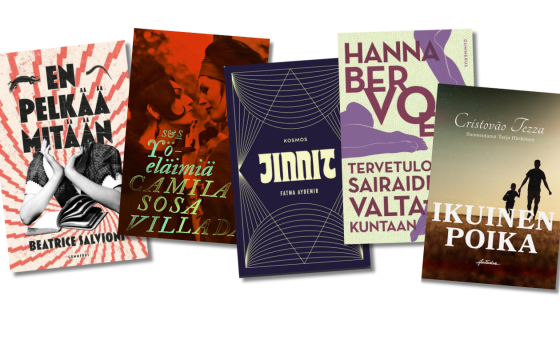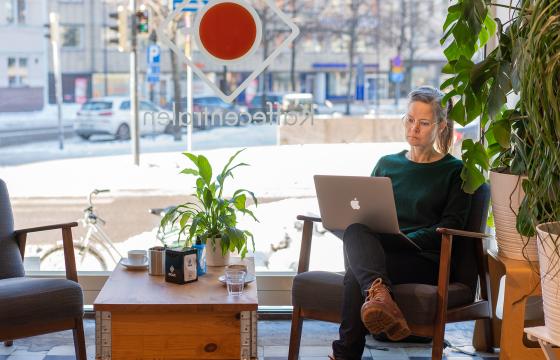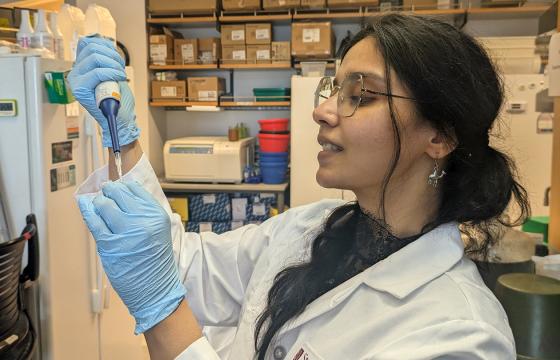Reetta Kivelä
The prize is awarded for developing the perfect basic oat product, for responsible culinary innovation, and for modernising Finnish cuisine.
Reetta Kivelä is a Doctor of Science in Food Technology and a co-inventor of the oat-based vegetarian protein Pulled Oats (Nyhtökaura).
Kivelä graduated with a Master of Science in Food Chemistry from the University of Helsinki in 2003. In 2011, her thesis was selected as the the year’s best dissertation in applied biosciences from the University of Helsinki. Kivelä was the first researcher in the world to discover in an oxidation mechanism the cause for oat beta-glucan degradation during storage.
In 2014, Kivelä began testing the possibilities for using oats as a source of protein, based on an idea from her old friend, the industrial designer Maija Itkonen. Itkonen, Kivelä and Zhongqing Jiang established the start-up Gold&Green Foods. After a long and winding journey, reaching as far as China, the product branded as Pulled Oats was launched in shops in 2016. It has just five basic ingredients: oat, yellow peas, broad beans, cold-pressed rapeseed oil and salt. Demand for Pulled Oats was huge from the start, and in 2017 consumers voted it the Finnish Food of the Year.
Accolades received by Reetta Kivelä have included Chief Technology Officer of the Year, Young Research Entrepreneur of the Year, and University of Helsinki Alumna of the Year.
Outi Pieski
The prize is awarded for tying everlasting knots, for defending northern nature and peoples, and for making nonverbal history come alive.
Visual artist Outi Pieski is known for her impressive installations, as well as for paintings and photographs with themes relating to northern nature and Sámi culture.
Pieski grew up in Helsinki and graduated from the Academy of Fine Arts. She also studied traditional Sámi crafts at the Sámi Education Institute in Inari, northern Finland. She now divides her time living and working between southern Finland and her Sámi father’s home region of Utsjoki in the far north.
Sámi handcrafts are an immeasurably valuable cultural heritage. Pieski combines the ancient colours, forms and techniques of Sámi handcrafts with contemporary art traditions. Her paintings glow with northern light, while drawing from present-day subject matter. Some of her central themes are the history and future of the Sámi peoples, indigenous rights, human relationships with nature, equality, and sustainable development. Her light artwork at the Lux Helsinki festival in 2017, which consisted of images of water flowing freely from the windows of Helsinki Cathedral, drew attention to the issues of water rights, water usage and environmentalism.
Pieski is not only an active advocate of Sámi culture but also a master craftswoman. Her work manages to make nature, culture and art simultaneously local and universal. Pieski received the Fine Arts Academy of Finland Prize in 2017, and took part in creating the Finnish pavilion at the 2019 Venice Biennale.
Risto Saarinen
The prize is awarded to an ecumenical thinker for building bridges and upholding hope.
Risto Saarinen is a Professor of Ecumenical Research at the University of Helsinki, a highly valued investigative scientist, and a member of the international community of non-denominational theologians.
Saarinen has doctorates in both Theology and Philosophy from the University of Helsinki, as well as an honorary doctorate in Theology from the University of Copenhagen. He has led numerous research projects, most recently a centre of excellence of the Academy of Finland entitled Reason and Religious Recognition.
Saarinen’s publications include hundreds of scholarly articles and 27 books. In parallel with his extensive international career, he has written some works for a more lay audience, and has recently completed a trilogy on love, trust and hope for scholarly and lay audiences alike, published by Gaudeamus.
Saarinen tutors younger theologians and philosophers at all levels, from first-year students to recognised Finnish and international talents. He has made significant efforts to construct global research networks. Within the field of theology, Saarinen builds bridges between systematic, empirical and practical theology. In recent years, Saarinen has also tackled the contemporary theme of relations between religion and politics. His answer to fear-mongering and confrontation is a theology of hope.


